FDIC backing 8,000 banks with $13 trillion in assets and a negative deposit insurance fund. FDIC survey finds millions of U.S. households are underbanked. Too big to fail banks add branches and grow even bigger.
- 2 Comment
The FDIC has a big problem on its hand. Some would say it is a too big to fail problem. The Federal Deposit Insurance Corporation looks over 8,000+ banks and protects the deposits at these banks. Yet this seemingly large number is merely a front for where the assets are congregated. The top 4 banks of Bank of America, JP Morgan Chase, Wells Fargo, and Citibank make up 55 percent of all banking assets. This number is absolutely large. FDIC backed institutions have $13 trillion in total assets. Even yesterday as Wall Street demonstrated the dangers of concentrated power in a few big investment banks, rumors were flying around that some of the bigger banks made sizeable gains in their trading portfolios. This brings up many questions for average Americans who are under the impression that their bank is actually keeping their money safe and sound instead of placing major bets on the stock market.
Yet the major bets will continue because during the news heavy day, what wasn’t reported through the mainstream media was how the too big to fail amendment failed in the Senate. Just take a look at the assets of the too big to fail:
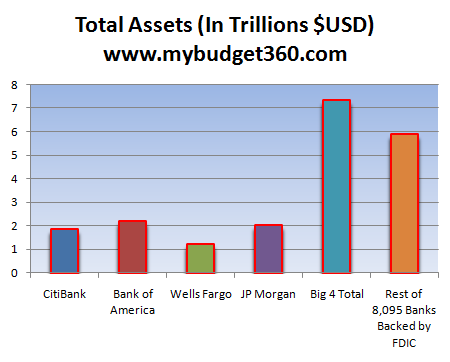
Source:Â FDIC, Bank Financial Statements
The above must be changed yet Congress isn’t willing to move. What this means is that we will see more and more local regional bank failures as the commercial real estate bust continues to hit the economy. Yet people still need banking services and this provides an easy way for the bigger banks to actually get bigger. Think this isn’t the case?
“J.P. Morgan Chase said Wednesday that it will open 90 branches in California this year, adding 1,200 jobs and bringing its statewide network to 800 branches and 3,000 ATMs.
Chase (NYSE: JPM) said 35 of those branches will be in Northern California, 18 opening in the Bay Area.
“California is an important and growing market for Chase and we will continually invest in the people, facilities and technology needed to serve California consumers and businesses well,†said Pablo Sanchez, who manages Chase’s branch network in the western United States.â€
So as the FDIC is busy on Fridays with closing banks, we have JP Morgan Chase opening up more banks in California. Even if the too big to fail banks are gouging Americans with credit card terms, restricting access to credit, and consolidating their power they are making large amounts of money through their investment banking units. We have already learned through the experience of this market that the government is unwilling or unable to shut down the bigger banks. As we have noted above, they are even getting bigger.
At the same time, the list of troubled institutions grows:
The FDIC has its hands full because we will have at least 1,000 bank failures ex-the too big to fail banks when this crisis is said and done. Even the troubled institutions of smaller banks have large amounts of assets:
At currently troubled banks labeled by the FDIC $402 billion is under their management. And as we saw last week with over $7 billion in costs for 7 failed banks, the FDIC fund is getting extremely close to requiring a government bailout.  When everything is subject to a bailout, you take the infectious problems of the banks and toxic loans and transfer the risk to the entity doing the bailing out. That is why the U.S. markets are having such a volatile reaction to what is currently going on. If you think bringing on large amounts of debt is good for the country just look at Greece. Having too much debt is not a way forward in achieving prosperity.
As people in the middle class try to get by in this Great Recession, these banks that are essentially protected by the government through trillions in bailouts are also the largest players in the credit card markets:
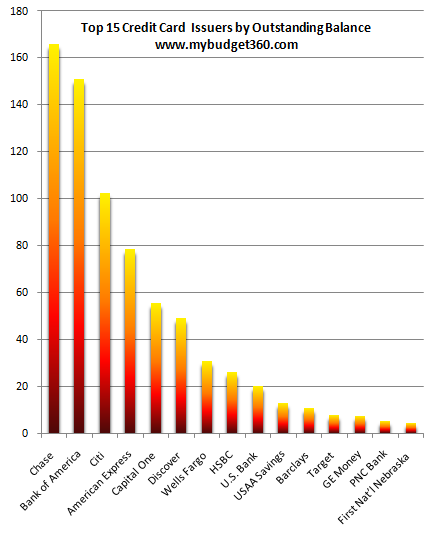
So while bankruptcies are soaring for Americans, these banks have the ultimate get out of jail free card. For the average working class American they are being gouged by onerous fees and high rates all the while taxpayers are giving banks easy access to cheap money so they can go off and gamble in the stock market. Massive market volatility is not a sign of a healthy market. In fact, many of the biggest historical jumps and falls occurred during the Great Depression. The 1,000 intraday drop on the Dow was the largest on record.
Yet we have to ask, the FDIC has been a sign of stability for most Americans when they see the label on the bank door. Yet how can we feel confident when $13 trillion in assets are under control from the 8,000 banks and yet the actual insurance fund only has a few billion dollars (a number that is quickly approaching zero even after years of advanced premiums paid by member banks)? This number can be wiped out with two big Fridays. In reality, even one too big to fail bank would wipe out the FDIC completely. This has never been an issue of liquidity; this is an issue of solvency. The core of the problem is that many banks have too much debt that isn’t valued at what banks would like it to be valued at.
The FDIC conducted a recent survey and found that many U.S. households are underbanked:
“ A substantial percentage of lower-income households are unbanked. Nearly 20 percent of lower income U.S. households—almost 7 million households earning below $30,000 per year—do not currently have a bank account. Households with earnings below $30,000 account for at least 71 percent of unbanked households.   Â
Not having enough money to feel they need an account is the most common reason why unbanked households are not participating in the mainstream financial system.â€
I’m not sure if this is even a surprise. I would also suspect that many people now just don’t trust the banking industry. The FDIC is going to be busy for a few years because the reality is, there are trillions in toxic assets that are overvalued on the balance sheet of banks. Commercial real estate will bring down many banks in the current year. Until we have serious change in the system, expect these kinds of massive raids on the market to continue while middle class Americans are caught in the battle.
If you enjoyed this post click here to subscribe to a complete feed and stay up to date with today’s challenging market!2 Comments on this post
Trackbacks
-
HungrySeagull said:
We got completely out of FDIC Banks entirely and moved very rapidly and completely to a NCUA (Credit Union) bank.
We have ruthlessly paid off debt and are using credit lines like scorched earth, purchase something on saturday, pay off and close the account monday morning cold cash.
Unsecured debt lines are being used to solve problems that crop up in life. Then they are slashed as fast as possible. If inflation kicks in and interest rates zoom up, we will not be able to meet our budget.
We can cut costs to the household by dumping satellite and other things and pour more money into the budget.
We are growing many food items like tomatoes ourselves this year. Less reliance on the walmart. I say we because all of our neighbors are doing the same. I think there are several acres in place so far and doing well.
We have laid in and are continuing to improve on self reliance supplies. At least 4 weeks food, at least 3 months water (Toilet and drinking/cooking) and possibly at least several different items to handle various problems off grid, like firewood and outdoor dutch ovens to cook food with.
We are laying in knowledge from Colonial Times and from the Western Migration in order to share and teach other neighbors for trade as a asset so that we will get through this no matter what happens to all the fine wonderful technology we have enjoyed. (Electricity etc)
We are working with friends and neighbors to hire them to pay for small jobs to do and keep the United States dollar here at home as much as possible. I had a belt made in the Carolina by hand last year as opposed to buying a imported belt in walmart.
We are putting people to work as much as we can to do things to fix, upgrade and repair our home as fast as possible because the next ten years are going to be very difficult. For example, the Plumber has been very busy these last few years.
Home security is not the alarm system as popularized in commercials scaring off bad guys. We have weapons, ammunition and train with them at the range regularly to improve marksmanship, problem solving and study the laws so that we are secure.
We have moved out of states with very restrictive laws and high costs of living and made a new life in free states with less restrictive laws and much lower cost of living. For example we paid 150 a year to tag vehicles, now we only pay about 25-30 at the most.
If A hurricane goes through or Iran explodes making our local gas stations empty, we have sufficient fuel on hand to drive to work 6 weeks or more.
We have quit working 60 miles away. We work less than 20 miles away and are not relying on that work to pay the bills. We hope to have everything paid off and nothing but water, utilities and food to budget each month.
Everything else is gravy. Cash converted to problem solving while we can.
First 100 items to disappear:
http://www.thepowerhour.com/news/items_disappearfirst.htm
Finally but not least, forget the FDIC banks and do what you need to do in Credit union or other banks to keep your finances going.
May 30th, 2010 at 9:38 pm -
Malachi said:
Can we liquidate that $13 trillion dollars in assets?
March 14th, 2012 at 7:32 pm
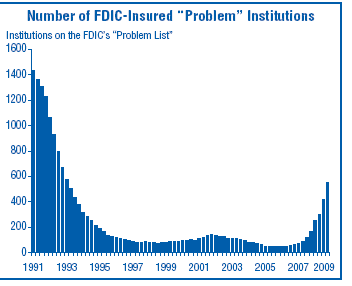
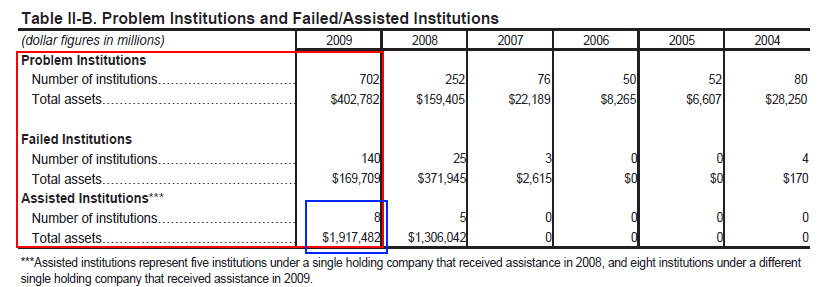
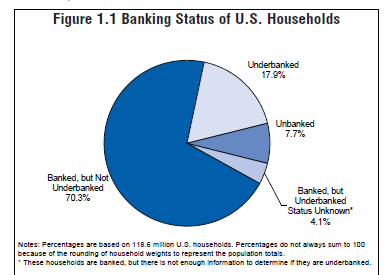
 If you enjoyed this post click here to subscribe to a complete feed and stay up to date with today’s challenging market!
If you enjoyed this post click here to subscribe to a complete feed and stay up to date with today’s challenging market! Follow us on Twitter!
Follow us on Twitter!